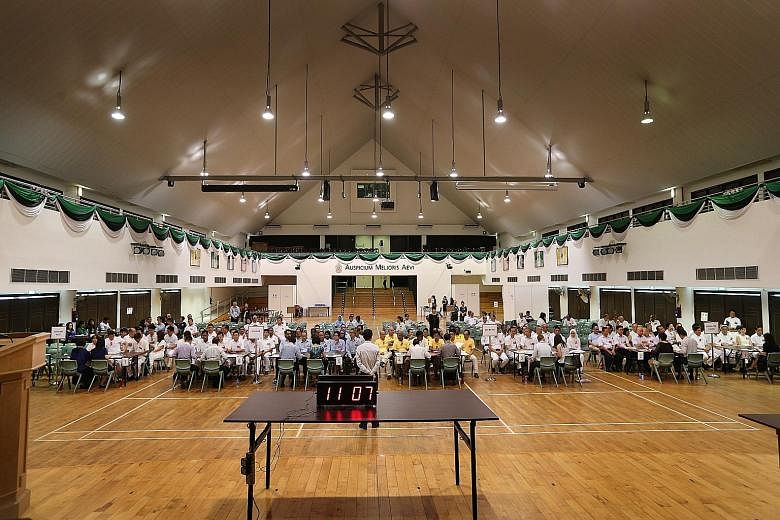The choice before voters comes down to this: a long-serving People's Action Party (PAP) government that says it is the best chance Singapore has to stay exceptional, versus opposition parties that symbolise the desire of many for the very opposite - a more normal politics.
The Workers' Party (WP) has been the most adept at giving voice to those who want greater contestation, rallying voters in this campaign with its slogan - Empower Your Future.
In a message to voters published on the party's website yesterday, WP chief Low Thia Khiang urged voters to first send a signal to the ruling party that the Government should continue to be transparent, accountable and responsive to people's needs. Second, he called on voters to "empower yourself to participate in the decision-making process to shape your own future and the future of your children".
He also criticised "the ruling party's mindset of monopolising power to exercise control over almost every aspect of our society", saying this hindered growth to become an excellent and outstanding nation.
The PAP rejoinder came during a press conference to kick off its campaign, at which Prime Minister Lee Hsien Loong debunked the notion that, the more opposition in Parliament, the better. He compared the performance of the 10 opposition members in the last Parliament to that of "a mouse in the House". They made fierce speeches on all manner of issues outside the House, but remained mum when these came up for debates in Parliament, he charged.
Nine of the 10 were from the WP and one from the Singapore People's Party of Mr Chiam See Tong.
PM Lee also quoted a report from global political risk consultancy Eurasia Group, which said this election in Singapore's 50th year of independence and after the death of founding Prime Minister Lee Kuan Yew would determine whether the Republic remained special.
The report described Singapore as "a kind of unicorn", Mr Lee said, adding: "There's no other unicorn in the world and it works well. It has unique solutions and the rest of the world is not sure what to make with it. The question is, will Singapore remain a unicorn, remain successful, or will it become ordinary and just like everybody else?"
He then went on to set out what he saw as the politics of ordinary countries, which he likened to a game in which voters threatened the government, prompting the government to do more for them.
"If you play that kind of game, you will very soon be in the same kind of jam as other countries which do this. We have not had that formula. Our formula has been: Work together, build the trust. The Government does the right things for voters to the best of our ability.
"Sometimes, we make mistakes; sometimes, it falls short of what the voters expect because it's harder to do than we imagined. But, overall, there is that basic trust that I'm doing this on your behalf, otherwise, I wouldn't be doing this. There's no money in this," he said.
One grave national challenge where such trust will be crucial is that of population growth, against the backdrop of a rapidly ageing society.
On at least three occasions in the last two months, Mr Lee has highlighted the population issue as one in which there are no easy answers.
During his National Day Rally speech last month, he assured Singaporeans that his government has heard their strong views on immigration and foreigners and adjusted its policies, with upgrades to public infrastructure, slower foreign worker inflows and tightening of permanent resident and citizenship applications. But it cannot close the doors completely to foreigners or the economy will tank, he warned.
"Whichever option we choose, it will involve some pain," he said.
"But I believe that I am doing what Singapore needs and what best safeguards your interest... It is my responsibility to make this decision and act on your behalf," he added.
Why the special effort to soften the ground on this issue?
One factor must surely be that during the last General Election of 2011, his team of ministers tripped up by failing to anticipate and mitigate against the cost to Singaporeans of large foreign worker inflows. That provided the opposition parties with ready ammunition to attack the PAP.
This time round, several opposition parties have already made plain that they plan to reprise their attacks on the issue as the battle for votes heats up.
The population issue is but one example of the difficult challenges the PAP government hopes voters will continue to trust its judgment on. That is its model of governance, which it considers essential to keeping Singapore a unicorn.
This election will be a test of whether voters agree.
Ultimately, their choice will rest on who they trust more to champion their interests.
Will it be the PAP with its outstanding track record of having led Singapore from Third World to First, but whose big-picture, long-term approach to policy planning has delivered results, though not without some pain to those affected?
Or will it be the opposition parties that promise to prod the PAP into being more responsive?
Whether PAP or opposition, the politicians who have put themselves forward for this campaign have nine days to swing voters round to their view.

